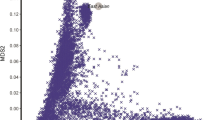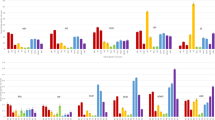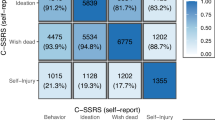Abstract
We investigate how selection of psychiatric cases by phenotypic criteria can alter the strength and specificity of their genetic risk by examining samples from national Swedish registries for five disorders: major depression (MD, N = 158,557), drug use disorder (DUD, N = 69,841), bipolar disorder (BD, N = 13,530)) ADHD (N = 54,996) and schizophrenia (N = 11,227)). We maximized the family genetic risk score (FGRS) for each disorder and then the specificity of the FGRS in six disorder pairs by univariable and multivariable regression. We use split-half methods to divide our cases for each disorder into deciles for prediction of genetic risk magnitude and quintiles for prediction of specificity by FGRS differences between two disorders. We utilized seven predictor groups: demography/sex, # registrations, site of diagnosis, severity, comorbidity, treatment, and educational/social variables. The ratio of the FGRS in the upper vs two lower deciles from our multivariable prediction model was, in order, DUD – 12.6, MD – 4.9, BD – 4.5, ADHD – 3.3 and schizophrenia 1.4. From the lowest to highest quintile, our measures of genetic specificity increased more than five-fold for i) MD vs. Anxiety Disorders, ii) MD vs BD, iii) MD versus alcohol use disorder (AUD), iv) BD vs schizophrenia and v) DUD vs AUD. This increase was nearly two-fold for ADHD vs DUD. We conclude that the level of genetic liability for our psychiatric disorders could be substantially enriched by selection of cases with our predictors. Specificity of genetic risk could also be substantially impacted by these same predictors.
This is a preview of subscription content, access via your institution
Access options
Subscribe to this journal
Receive 12 print issues and online access
$259.00 per year
only $21.58 per issue
Buy this article
- Purchase on Springer Link
- Instant access to full article PDF
Prices may be subject to local taxes which are calculated during checkout


Similar content being viewed by others
Data availability
KS MD PhD had full access to all the data in the study and takes responsibility for the integrity of the data and the accuracy of the data analysis.
References
Weissman MM, Wickramaratne P, Merikangas KR, Leckman JF, Prusoff BA, Caruso KA, et al. Onset of major depression in early adulthood. Increased familial loading and specificity. Arch Gen Psychiatry. 1984;41:1136–43.
Sullivan PF, Neale MC, Kendler KS. Genetic epidemiology of major depression: review and meta-analysis. Am J Psychiatry. 2000;157:1552–62.
Rajagopal VM, Duan J, Vilar-Ribó L, Grove J, Zayats T, Ramos-Quiroga JA, et al. Differences in the genetic architecture of common and rare variants in childhood, persistent and late-diagnosed attention-deficit hyperactivity disorder. Nat Genet. 2022;54:1117–24.
Kendler KS, Gatz M, Gardner CO, Pedersen NL. Age at onset and familial risk for major depression in a Swedish national twin sample. Psychol Med. 2005;35:1573–9.
Faraone SV. Genetics of adult attention-deficit/hyperactivity disorder. Psychiatr Clin North Am. 2004;27:303–21.
Leboyer M, Henry C, Paillere-Martinot ML, Bellivier F. Age at onset in bipolar affective disorders: a review. Bipolar Disord. 2005;7:111–8.
Kendler KS, Ohlsson H, Sundquist K, Sundquist J. Clinical features of drug abuse that reflect genetic risk. Psychol Med. 2014;44:2547–56.
Kendler KS. The diagnostic validity of melancholic major depression in a population- based sample of female twins. Arch Gen Psychiatry. 1997;54:299–304.
Kendler KS, Klee A. Bruno Schulz’s 1933 Monograph: On the Hereditary Etiology of Schizophrenia. Schizophr Bull. 2022;48:S45–S55.
CONVERGE consortium. Sparse whole-genome sequencing identifies two loci for major depressive disorder. Nature. 2015;523:588–91.
SAS Institute I. SAS/STAT® Online Documentation, Version 9.4. Cary, N.C.: SAS Institute, Inc. (2012).
Kendler KS, Aggen SH, Knudsen GP, Roysamb E, Neale MC, Reichborn-Kjennerud T. The Structure of Genetic and Environmental Risk Factors for Syndromal and Subsyndromal Common DSM-IV Axis I and All Axis II Disorders. Am J Psychiatry. 2011;168:29–39.
Grotzinger AD, Mallard TT, Akingbuwa WA, Ip HF, Adams MJ, Lewis CM, et al. Genetic architecture of 11 major psychiatric disorders at biobehavioral, functional genomic and molecular genetic levels of analysis. Nat Genet. 2022;54:548–59.
Kendler KS, Prescott CA, Myers J, Neale MC. The structure of genetic and environmental risk factors for common psychiatric and substance use disorders in men and women. Arch Gen Psychiatry. 2003;60:929–37.
Heath AC, Martin NG, Lynskey MT, Todorov AA, Madden PA. Estimating two-stage models for genetic influences on alcohol, tobacco or drug use initiation and dependence vulnerability in twin and family data. Twin Res. 2002;5:113–24.
Faraone SV, Larsson H. Genetics of attention deficit hyperactivity disorder. Mol Psychiatry. 2019;24:562–75.
Hatoum AS, Johnson EC, Colbert SM, Polimanti R, Zhou H, Walters RK, et al. The addiction risk factor: a unitary genetic vulnerability characterizes substance use disorders and their associations with common correlates. Neuropsychopharmacology. 2022;47:1739–45.
Kendler KS, Sundquist K, Ohlsson H, Palmer K, Maes H, Winkleby MA, et al. Genetic and familial environmental influences on the risk for drug abuse: a national Swedish adoption study. Arch Gen Psychiatry. 2012;69:690–7.
Kendler KS, Ji J, Edwards AC, Ohlsson H, Sundquist J, Sundquist K. An Extended Swedish National Adoption Study of Alcohol Use Disorder. JAMA Psychiatry. 2015;72:211–8.
Pettersson E, Larsson H, Lichtenstein P. Common psychiatric disorders share the same genetic origin: a multivariate sibling study of the Swedish population. Mol Psychiatry. 2016;21:717–21.
Bulik-Sullivan B, Finucane HK, Anttila V, Gusev A, Day FR, Loh PR, et al. An atlas of genetic correlations across human diseases and traits. Nat Genet. 2015;47:1236–41.
Abdellaoui A, Hugh-Jones D, Yengo L, Kemper KE, Nivard MG, Veul L, et al. Genetic correlates of social stratification in Great Britain. Nat Hum Behav. 2019;3:1332–42.
Lee SH, Ripke S, Neale BM, Faraone SV, Purcell SM, Perlis RH, et al. Genetic relationship between five psychiatric disorders estimated from genome-wide SNPs. Nat Genet. 2013;45:984–94.
Brainstorm C, Anttila V, Bulik-Sullivan B, Finucane HK, Walters RK, Bras J, et al. Analysis of shared heritability in common disorders of the brain. Science. 2018;360:1313.
Lichtenstein P, Bjork C, Hultman CM, Scolnick E, Sklar P, Sullivan PF. Recurrence risks for schizophrenia in a Swedish national cohort. Psychological Med. 2006;36:1417–25.
Sellgren C, Landen M, Lichtenstein P, Hultman CM, Langstrom N. Validity of bipolar disorder hospital discharge diagnoses: file review and multiple register linkage in Sweden. Acta Psychiatr Scand. 2011;124:447–53.
Ekholm B, Ekholm A, Adolfsson R, Vares M, Osby U, Sedvall GC, et al. Evaluation of diagnostic procedures in Swedish patients with schizophrenia and related psychoses. Nord J Psychiatry. 2005;59:457–64.
Kendler KS, Ohlsson H, Lichtenstein P, Sundquist J, Sundquist K. The Genetic Epidemiology of Treated Major Depression in Sweden. Am J Psychiatry. 2018;175:1137–44.
Sundquist J, Ohlsson H, Sundquist K, Kendler KS. Common Adult Psychiatric Disorders in Swedish Primary Care (Where Most Mental Health Patients are Treated). BMC Psychiatry. 2017;17:235.
Kendler KS, Abrahamsson L, Ohlsson H, Sundquist J, Sundquist K. An Extended Swedish Adoption Study of Anxiety Disorder and Its Cross-Generational Familial Relationship With Major Depression. Am J Psychiatry. 2022;179:640–9.
Kendler KS, Lönn SL, Salvatore J, Sundquist J, Sundquist K. The Origin of Spousal Resemblance for Alcohol Use Disorder. JAMA Psychiatry. 2018;75:280–6.
Prescott CA, Kendler KS. Genetic and environmental contributions to alcohol abuse and dependence in a population-based sample of male twins. Am J Psychiatry. 1999;156:34–40.
Tsuang MT, Lyons MJ, Eisen SA, Goldberg J, True W, Lin N, et al. Genetic influences on DSM-III-R drug abuse and dependence: a study of 3,372 twin pairs. Am J Med Genet. 1996;67:473–7.
Kendler KS, Ohlsson H, Sundquist J, Sundquist K. Family Genetic Risk Scores and the Genetic Architecture of Major Affective and Psychotic Disorders in a Swedish National Sample. JAMA Psychiatry. 2021;78:735–43.
Kendler KS, Ohlsson H, Sundquist J, Sundquist K. The patterns of family genetic risk scores for eleven major psychiatric and substance use disorders in a Swedish national sample. Transl Psychiatry. 2021;11:1–8.
Kendler K, Ohlsson H, Sundquist J, Sundquist K. The Impact of Sex, Age at Onset, Recurrence, Mode of Ascertainment and Medical Complications on the Family Genetic Risk Score Profiles for Alcohol Use Disorder. Psychol Med. 2023;53:1732–40. In press
Kendler KS, Ohlsson H, Mościcki EK, Sundquist J, Edwards AC, Sundquist K. Genetic Liability to Suicide Attempt, Suicide Death and Psychiatric and Substance Use Disorders on the Risk for Suicide Attempt and Suicide Death: A Swedish National Study. Psychol Med. 2023;53:1639–48. In press
Kendler KS, Ohlsson H, Bacanu S, Sundquist J, Edwards AC, Sundquist K. Differences in Genetic Risk Score Profiles for Drug Use Disorder, Major Depression and ADHD as a Function of Sex, Age at Onset, Recurrence, Mode of Ascertainment and Treatment. Psychol Med. 2023;53:3448–60. In press
Kendler KS, Ohlsson H, Sundquist J, Sundquist K. The Moderation of the Genetic Risk for Alcohol and Drug Use Disorders in a Swedish National Sample by the Genetic Aptitude for Educational Attainment. Psychol Med. 2023;53:3077–84. In press
Kendler KS, Rosmalen JGM, Ohlsson H, Sundquist J, Sundquist K. A distinctive profile of family genetic risk scores in a Swedish national sample of cases of fibromyalgia, irritable bowel syndrome, and chronic fatigue syndrome compared to rheumatoid arthritis and major depression. Psychol Med. 2022;1-8.
Hujoel ML, Gazal S, Loh P-R, Patterson N, Price AL. Liability threshold modeling of case–control status and family history of disease increases association power. Nat Genet. 2020;52:541–7.
Funding
This project was supported by grants AA023534 and DA030005 from the National Institutes of Health and the Swedish Research Council (2020–01175).
Author information
Authors and Affiliations
Contributions
KSK developed the hypothesis and HO performed the statistical analyses. KSK drafted the manuscript with input from JS, KS, and HO who all reviewed the MS. JS and KS oversaw and kept updated the registry resources needed for these analyses.
Corresponding author
Ethics declarations
Competing interests
The authors declare no competing interests.
Additional information
Publisher’s note Springer Nature remains neutral with regard to jurisdictional claims in published maps and institutional affiliations.
Supplementary information
Rights and permissions
Springer Nature or its licensor (e.g. a society or other partner) holds exclusive rights to this article under a publishing agreement with the author(s) or other rightsholder(s); author self-archiving of the accepted manuscript version of this article is solely governed by the terms of such publishing agreement and applicable law.
About this article
Cite this article
Kendler, K.S., Ohlsson, H., Sundquist, J. et al. Selecting cases of major psychiatric and substance use disorders in Swedish national registries on the basis of clinical features to maximize the strength or specificity of the genetic risk. Mol Psychiatry 28, 5195–5205 (2023). https://doi.org/10.1038/s41380-023-02156-2
Received:
Revised:
Accepted:
Published:
Issue Date:
DOI: https://doi.org/10.1038/s41380-023-02156-2



